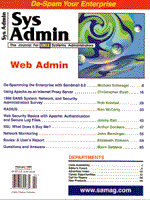
1998 SANS System, Network, and Security Administration Survey
Rob Kolstad [Editor's Note: We are pleased to offer the following excerpts from the Fifth Annual SANS Salary Survey, courtesy of the SANS Institute. By collecting this data, the SANS Institute provides us with an interesting assessment of where systems administrators stand within the industry. We have extracted only a few of the charts from the complete survey - those which we felt would be particularly interesting to Sys Admin readers. For a more complete picture, you certainly will want to obtain the full survey from SANS. Some may point out (indeed, SANS was among the first to do so) that the voluntary manner in which the data was collected diminishes the statistical validity of the information. Interestingly, the same argument can be applied to elections as indicators of public opinion. Although voting, due to its voluntary nature, may lack statistical validity as an opinion indicator, the results are, nonetheless, decisive. Similarly, salary and career information from close to 7,000 working systems administrators is of considerable value to us all. We think you will find this information both interesting, and helpful in your own career. -Ralph Barker] The positions held by systems administrators, network administrators, and security professionals continue to become ever more critical as businesses increase their reliance on data processing and computer networking. These professionals ensure that computer systems continue to operate, that data is not lost (either through mismanagement or malicious break-ins), that users have easy and continuous access to the resources necessary to perform their jobs, and that electronic commerce continues quickly and securely. Their skill, perseverance, patience, and creativity directly impact the productivity of every computer user in organizations from the smallest, one-site company to the largest global enterprise. The relentless law of supply and demand has pushed the salaries of these professionals higher and higher during the past few years. The average salary increase reported by almost 7,000 respondents to this survey was 11.93% from last year. The Northeast and Southwest regions of the United States continue to be the technological salary hotbeds. This 5th Annual SANS Salary Survey reflects data from 7,180 system administrators from the entire gamut of industries. We hope you find the information presented here useful, but do ask that it not be reproduced in any way without prior written permission from the SANS Institute. Main OS Platforms Respondents were asked to choose a single "main" operating system (Table 1), which disgruntled some participants who wished not to choose just one platform. If an OS wasn't mentioned in the initial table, respondents could fill in a new name - hundreds did so and thus augmented this table. Note that Table 1 reflects the growing Linux movement with 2% of the respondents claiming Linux as their "main" platform. Administrator Type Respondents were asked to categorize their positions in one of the following types: Network, Security, or Systems Administration (Table 2). Security administrators seem to have a very slight edge in experience over their Network and Systems Administrator counterparts. The Salaries The average salary for 7151 respondents was $60,991/year. 6418 men averaged $61,328, while 733 women averaged $58,043/year. Table 3 shows how people fall into various ranges. The main conclusion this chart suggests is that living in the late 1990's and working in computer administration is surely a lucrative and wonderful profession. How Does Region Affect Salaries? The cost of living varies around the world. Table 4 shows how compensation varies. The United States Southwest (including California) and Northeast regions have significantly better pay scales than other regions. Of course, they also have higher expenses. Some of the lower-level salaried countries appear to be giving raises to increase their pay levels to the rest of the world. What Can Be Done to Increase Salary? The replies to the question "what motivated your pay increase" evoked a relatively homogeneous set of responses. The categories included:
Specific recommendations within these categories, along with advice for employers, are available from SANS. Contact the SANS institute via their Web page at: http:/www.sans.org or see the salary summary request page at: http:/www.sans.org/salsurvey98.htm. SANS also offers a free monthly Security Digest; subscribe by sending a "subscribe" message to autosans.clark.net. Conclusion Salaries are certainly doing well for the systems administration profession. Given the current situation of supply vs. demand and the apparent willingness of many administrators to change jobs, it is a seller's market. OS vendors are doing everything they can to reduce administrative costs, which will soon be the dominant expense for keeping computers in a business. Thus, it is incumbent on administrators to make sure employers understand their value. Too many computer purchasers think they are buying a solution instead of a tool. Perhaps someday computers will be tools that "just work", but until then, keep on learning, and let's build this profession into a great model for the modern work environment.
About the Author
Rob Kolstad is Program Manager for The SANS Institute, a non-profit research organization dedicated to education in System Administration, Networking, and Security. Prior to joining The SANS Institute, he was president of Berkeley Software Design, Inc., developer and marketer of Berkeley-style UNIX operating systems. Rob has worked for SUN, Prisma, and Convex Computer Corp. in addition to being the head coach of the U.S. Computing Olympiad programming team.
|